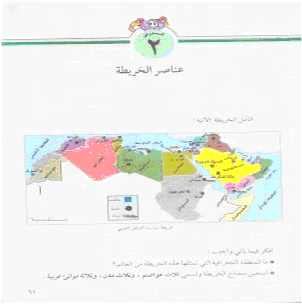Palestinian Textbooks: Palestinian Textbooks Continue to Incite
by Noa Meridor (March 2006)
An examination of Palestinian fifth and tenth-grade textbooks for the 2004-2005 school year shows a continuing denial of the State of Israel’s right to exist and a continuing cultivation of the values of armed struggle against Israel. The books contain incitement against the State of Israel and the Zionist movement, one of them even employing anti-Semitism.
 | A “Political map of the Arab homeland” in a fifth-grade geography textbook indicates Palestine while making no reference to Israel. As in previous years, the name of Israel once again does not appear in the textbooks examined, this being part of an educational policy that reflects a fundamental attitude denying the State of Israel’s right to exist. |
Main Findings1
- In the 2004-2005 school year, at the end of Yasser Arafat’s era and the beginning of Mahmoud Abbas’s (Abu Mazen) tenure, the Palestinian Education Ministry published 29 new textbooks for the fifth and tenth grades. We examined the books, used to this day, with the purpose of analyzing their outlook on issues related to the State of Israel, Zionism, the Jewish people, and the Palestinians’ attitude towards the State of Israel. The findings of the review of that year’s books, compared to books from previous years, indicate a consistent, long-standing negative attitude of the Palestinian curriculum towards the State of Israel, the Zionist movement, and the Jewish people.
- As in the past, the existence of the State of Israel is conspicuously ignored in this year’s curriculum. Israel does not appear on the maps, and when it does appear in written texts, it is only in negative contexts. The agreements achieved between Israel and the Palestinians are not mentioned. A strong emphasis is placed on the “Israeli occupation” and settlements in the “territories”, portrayed as part of the phenomenon of global imperialism, coveting the lands of the weak. The list of negative actions attributed to Israel has grown to include the construction of the Security Fence.
- To undermine the ideological foundation of the Zionist movement, the book authors keep ignoring the Israeli people’s profound historic connection with the Land of Israel. They do so by almost completely disregarding the ancient Jewish presence in the Land of Israel, and by defining the ancient inhabitants of the region as Arab peoples.2 As for the Palestinians’ attitude towards Israel, the books, as in the past, deal with war, violent confrontation, what they refer to as “the martyrdom of the Palestinian warriors,” and the refugees’ “right of return” to those places in Israel they left.
- An innovation of grave significance found in one of the 2004-2005 textbooks is the use of the Protocols of the Elders of Zion as a means to besmirch the Zionist movement, reiterating anti-Semitic myths on the Jews’ intention to take over the entire world (note: the authors of the book chose to omit that section from this page in another edition of the book). Furthermore, even though the subject of World War II and its consequences is covered in one of the textbooks, its authors chose to totally ignore the Holocaust.
- In the previous year (2003-2004), a positive change was observed in the textbooks, which indicated the Green Line and mentioned the agreements between the Palestinians and Israel. The 2004-2005 textbooks, however, show a regression, which is reflected in ignoring the agreements between Israel and the Palestinians and in renewing the practice of referring to population centers in Israel proper (within its pre-1967 borders) as “settlements” (the purpose being to portray them as illegitimate and temporary). Moreover, the textbooks also make use of anti-Semitic motifs as a means to attack the Zionist movement.
- These negative findings are characteristic of the Palestinian curriculum, based on an educational policy striving to indoctrinate the young generation of Palestinians with hatred against the State of Israel. It is reflected in the denial of Israel’s legitimacy, unwillingness to peacefully coexist with it, cultivation of hostility against Israel (and against the Jews, albeit to a lesser extent), attempt to refute the connection between the Jewish people and the Land of Israel by rewriting history, and inculcation of the concept of violent struggle as a positive national and religious value. This “education,” conducted in the Palestinian Authority’s education institutions, gives rise to new generations of students instilled with hatred against Israel, making peaceful coexistence between the two peoples highly difficult to achieve
*Ms. Noa Meridor is a researcher in the Defense Ministry’s office of the Coordinator of Israeli Government Activities in the Territories, yearly examining the contents of Palestinian textbooks, primarily focusing on the stance towards the State of Israel, the Zionist movement, and the Jewish people.
1This document includes the main findings of the examination of Palestinian textbooks for the 2004-2005 school year. A breakdown of the findings appears in Hebrew on the Intelligence and Terrorism Information Center website.The full document is currently being translated into English, and will be distributed in full once the translation is complete.
2Note by the Intelligence and Terrorism Information Center: This claim—a baseless one, as far as historical research is concerned—stems from the worldview of Arab nationalism, defining all those who ever lived in the “Arab homeland” as Arabs. The exception is the Jewish people.


